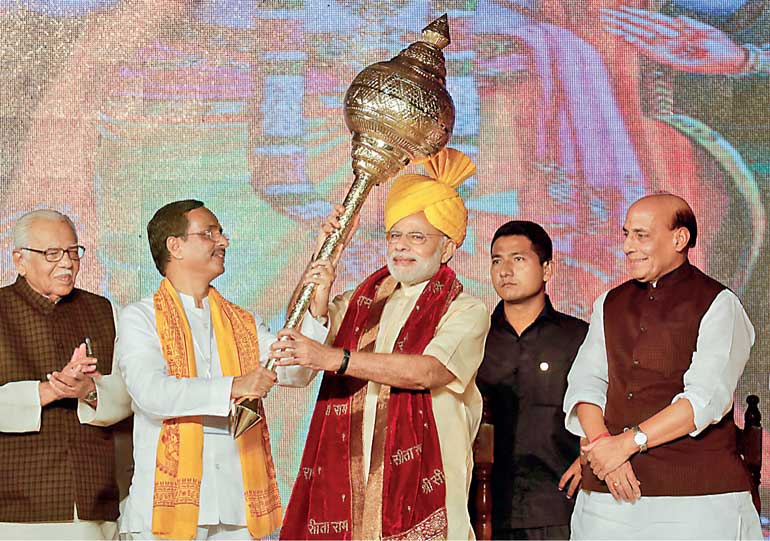Friday Feb 27, 2026
Friday Feb 27, 2026
Monday, 17 October 2016 00:01 - - {{hitsCtrl.values.hits}}
 Prime Minister Narendra Modi (C) holds a mace presented by Lucknow’s mayor Dinesh Sharma (2nd L) as Home Minister Rajnath Singh (R) looks on during Vijaya Dashmi or Dussehra festival celebrations in Lucknow, India, October 11, 2016. REUTERS
Prime Minister Narendra Modi (C) holds a mace presented by Lucknow’s mayor Dinesh Sharma (2nd L) as Home Minister Rajnath Singh (R) looks on during Vijaya Dashmi or Dussehra festival celebrations in Lucknow, India, October 11, 2016. REUTERS
Reuters: India’s Prime Minister Narendra Modi branded Pakistan a “mother-ship of terrorism” at a summit of the BRICS nations on Sunday, testing the cohesion of a group whose heavyweight member China is a close ally of its South Asian arch-rival.
Modi’s remarks to a meeting of leaders from the BRICS - which include Brazil, Russia, China and South Africa - escalated his diplomatic drive to isolate Pakistan, which India accuses of sponsoring cross-border terrorism.
Tension between the nuclear-armed neighbours has escalated since a 18 September attack on an army base in Kashmir, near the disputed frontier with Pakistan, killed 19 Indian soldiers in the worst such assault in 14 years.
India later said it had carried out retaliatory “surgical strikes” across the de facto border that inflicted significant casualties. Pakistan denied any role in the attack on the Uri army base, and said the Indian operation had not even happened, dismissing it as typical cross-border firing.
“In our own region, terrorism poses a grave threat to peace, security and development,” Modi said in his remarks to BRICS leaders who met at a resort hotel in Goa.
“Tragically, the mother-ship of terrorism is a country in India’s neighbourhood,” the 66-year-old prime minister said, without directly naming Pakistan, in a series of tweets issued by the foreign ministry.
No immediate reaction was available from Pakistan’s foreign ministry.
Modi’s posturing overshadowed the gathering of leaders of a group originally set up to boost economic cooperation. It followed a productive bilateral summit with President Vladimir Putin of Russia on Saturday that yielded billions of dollars in defence and energy deals.
The BRICS leaders had donned brightly coloured sleeveless jackets, of a style made popular by India’s first post-independence leader Jawaharlal Nehru, for an informal dinner on Saturday evening.
They were due later on Sunday to hold an outreach session with leaders from a little-known group of countries from the Bay of Bengal region whose key attribute, from India’s point of view, is that Pakistan is not a member.
Modi’s hard line against Pakistan marks a departure from India’s tradition of strategic restraint, and New Delhi has won expressions of support from both the West and Russia over the army base attack.
Yet China, a longstanding ally of Pakistan that plans to build a $46 billion export corridor, has shown public restraint.
Modi and President Xi Jinping also held a bilateral meeting on Saturday and the accounts of their conversation emerging from both sides pointed to key differences of opinion.
In one remark reported by the state Xinhua news agency, Xi said that China and India should “support each other in participating in regional affairs and enhance cooperation within multilateral frameworks”.
The dispatch went on to refer to the South Asian Association for Regional Cooperation (SAARC). This grouping includes Pakistan, which was to have hosted a summit in November that collapsed after India and other members pulled out.
The final BRICS summit declaration was expected to repeat earlier condemnations of “terrorism in all its forms”, say diplomats and analysts, but avoid levelling blame over tensions between India and Pakistan.
“Modi is aware that such language wouldn’t get the consensus necessary to make it into the final communique. Including it in his speech ensures it gets wide circulation anyway,” said South Asia expert Shashank Joshi.
“So far, we haven’t seen any indication at all that China is softening its public support for Pakistan. India did not expect differently,” added Joshi, a senior research fellow at the Royal United Services Institute in London.